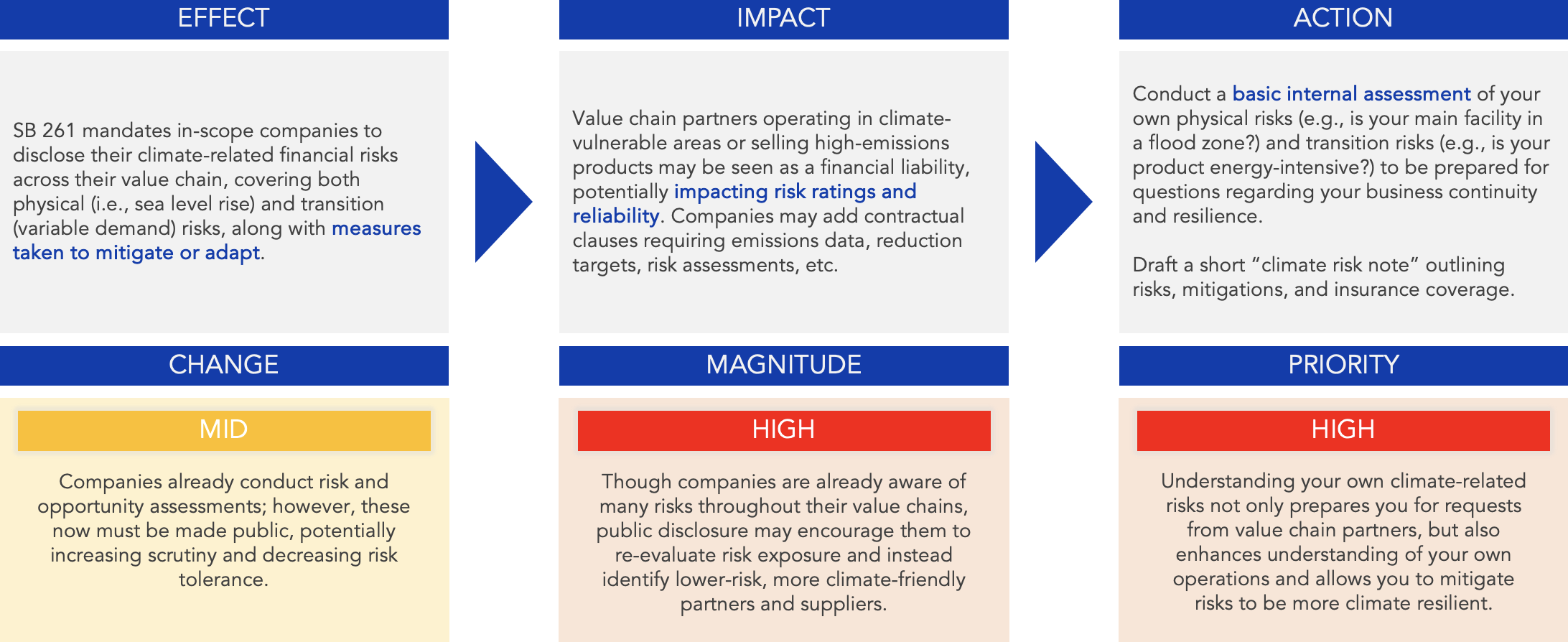Below the Billion-dollar Threshold
The hidden impact of California’s climate laws on small- and mid-market businesses
California has long been the unofficial testing ground for U.S. regulation, frequently setting the pace for the U.S. business landscape. What gets introduced there quickly becomes the industry standard nationwide, often impacting companies well outside of the scope of the original regulation. That was the case with California’s push towards electrifying vehicles, forcing major auto manufacturers to overhaul their strategies to favor EVs, encouraging utilities to update their infrastructure, and influencing several other states to adopt similar requirements. Now, California’s biggest and brightest sustainability regulation is likely to have the same effect.
In October of 2023, the California signed the “Climate Accountability Package” into law, requiring companies to disclose their greenhouse gas (GHG) emissions (SB 253) and publish climate-related financial risk reports (SB 261). For many major companies, these laws may be their first taste of mandatory, regulated climate reporting. And, like other regulations in the past, SB 253 and 261 have the potential to influence company strategies across sectors and regions.
We aren’t here bore you with legalese or compliance requirements - if you need more info than figure 1 above, go visit our friends on ERM’s insights page. Instead, we’d like to focus on the indirect impact of these regulations, and how small- and mid-market companies with in-scope value chain partners should prepare for implementation.
The Ripple Effect
California’s climate disclosure laws will only directly apply to a few thousand companies doing business in the state; a small fraction of the several millions of businesses operating across the U.S. Even so, the laws are likely to have an extended reach outside of both geographical boundaries and immediate scope, and may create cascading demands for climate-related data flowing towards small- and mid-market businesses nationwide.
Many larger companies within scope are already requesting this data from many of their value chain partners, often with minimal reporting burden. But with the increased oversight and requirements, the rigor and formality of these requests may change. This means companies outside of the formal scope should still prepare for increased data requests and elevated expectations for Scope 3 reporting, which is set to begin in 2027 disclosing prior year emissions.
So as a small- or mid-market company, why should you invest precious time and resources now, well before 2027? I’m so glad you asked!
Implementing good data collection, disclosure, and communication practices now won’t just be more resilient themselves; they will be seen as a more attractive, valuable partner in highly uncertain environment. Being ready to ride the regulatory wave with your partners means you become a part of their solution, not an additional problem.
Five Actions to Prepare Your Business
1. Prepare for partners to increase frequency and / or granularity of emissions data requests
2. Implement data readiness as a competitive non-price differentiator
3. Avoid being flagged as a value chain risk by evaluating your own climate risks
4. Invest in capacity building and communications to ensure broad stakeholder engagement
5. Fully integrate sustainability into your operations and strategic vision to build resilience
Beyond Compliance: Being a Resilient Partner
Start by reviewing your current practices. Are your value chain partners already requesting this data? Do you have systems in place to provide them with high-quality, audit ready figures? If so, great! Fortify and improve. If not, implementing a foundational collection process ASAP is key.
Then, build a more robust understanding of your own sustainability performance. If you already understand your GHG emissions, how can you make them more accurate? Do you know your own climate-related physical and transition risks? Get ready for in-scope value chain partners to ask about all of it.
And finally, fully integrate sustainability into your business practices. Sustainability isn’t just a marketing exercise or checking a regulatory box; it’s an integral part of being a resilient business. Sustainable and reliable operations will establish your organization as a valuable, forward-looking partner in the face of uncertain futures and increasing regulatory requirements.
California is setting the trend with their Climate Accountability Package: Be the data powerhouse your value chain needs, and make the Golden State's burden your golden opportunity.
Justin Nelson
Founder & Principal
Need help in becoming a trusted value chain partner? Or simply looking to understand how your company can strengthen its overall sustainability efforts?
Cascade Sustainability Consulting can help you with that and everything between.
Visit our services page to see what we can support with, and contact info@cascadesustain.com to inquire further.








